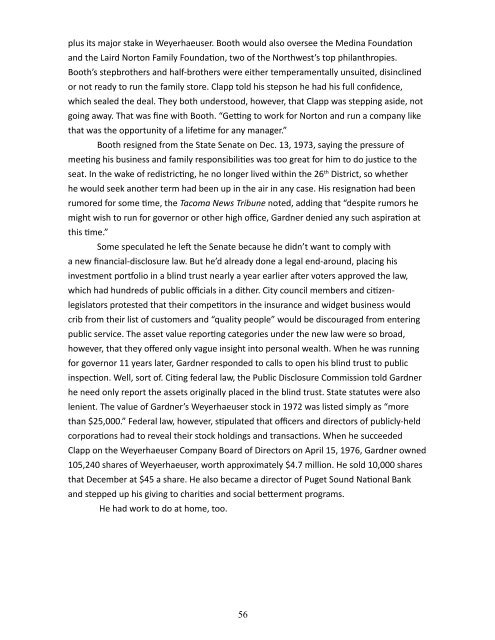booth gardner - Washington Secretary of State
booth gardner - Washington Secretary of State
booth gardner - Washington Secretary of State
Create successful ePaper yourself
Turn your PDF publications into a flip-book with our unique Google optimized e-Paper software.
plus its major stake in Weyerhaeuser. Booth would also oversee the Medina Foundation<br />
and the Laird Norton Family Foundation, two <strong>of</strong> the Northwest’s top philanthropies.<br />
Booth’s stepbrothers and half-brothers were either temperamentally unsuited, disinclined<br />
or not ready to run the family store. Clapp told his stepson he had his full confidence,<br />
which sealed the deal. They both understood, however, that Clapp was stepping aside, not<br />
going away. That was fine with Booth. “Getting to work for Norton and run a company like<br />
that was the opportunity <strong>of</strong> a lifetime for any manager.”<br />
Booth resigned from the <strong>State</strong> Senate on Dec. 13, 1973, saying the pressure <strong>of</strong><br />
meeting his business and family responsibilities was too great for him to do justice to the<br />
seat. In the wake <strong>of</strong> redistricting, he no longer lived within the 26 th District, so whether<br />
he would seek another term had been up in the air in any case. His resignation had been<br />
rumored for some time, the Tacoma News Tribune noted, adding that “despite rumors he<br />
might wish to run for governor or other high <strong>of</strong>fice, Gardner denied any such aspiration at<br />
this time.”<br />
Some speculated he left the Senate because he didn’t want to comply with<br />
a new financial-disclosure law. But he’d already done a legal end-around, placing his<br />
investment portfolio in a blind trust nearly a year earlier after voters approved the law,<br />
which had hundreds <strong>of</strong> public <strong>of</strong>ficials in a dither. City council members and citizenlegislators<br />
protested that their competitors in the insurance and widget business would<br />
crib from their list <strong>of</strong> customers and “quality people” would be discouraged from entering<br />
public service. The asset value reporting categories under the new law were so broad,<br />
however, that they <strong>of</strong>fered only vague insight into personal wealth. When he was running<br />
for governor 11 years later, Gardner responded to calls to open his blind trust to public<br />
inspection. Well, sort <strong>of</strong>. Citing federal law, the Public Disclosure Commission told Gardner<br />
he need only report the assets originally placed in the blind trust. <strong>State</strong> statutes were also<br />
lenient. The value <strong>of</strong> Gardner’s Weyerhaeuser stock in 1972 was listed simply as “more<br />
than $25,000.” Federal law, however, stipulated that <strong>of</strong>ficers and directors <strong>of</strong> publicly-held<br />
corporations had to reveal their stock holdings and transactions. When he succeeded<br />
Clapp on the Weyerhaeuser Company Board <strong>of</strong> Directors on April 15, 1976, Gardner owned<br />
105,240 shares <strong>of</strong> Weyerhaeuser, worth approximately $4.7 million. He sold 10,000 shares<br />
that December at $45 a share. He also became a director <strong>of</strong> Puget Sound National Bank<br />
and stepped up his giving to charities and social betterment programs.<br />
He had work to do at home, too.<br />
56

















